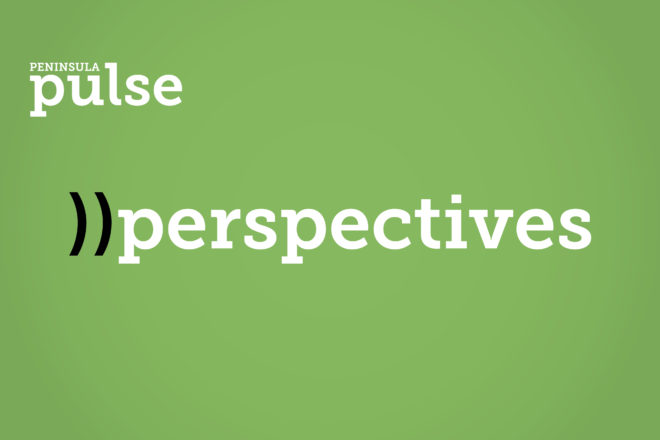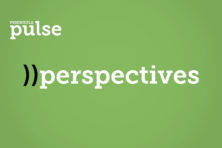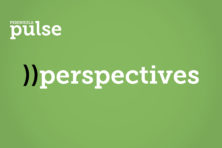Guest Column: Democracy and Journalism, Fueled by Everyday Conversation
- Share
- Tweet
- Pin
- Share

by G. MICHAEL KILLENBERG and ROB ANDERSON
In our often idyllic Door County, much of the partisan anger roiling elsewhere in America can feel distant and nonthreatening. But threats to democracy remain as near as an insulting Twitter post, hate-filled tirades from elected officials, a cable talk show pretending to be news, or even a family get-together that ends in accusations and dismissiveness.
Many citizens are quick to assume that those they define as opponents must be defeated, vilified or aren’t worth talking to at all. Political leaders exploit the problem and rely on lies and disinformation to keep us polarized and suspicious.
It is no accident that traditional or legacy journalism is under attack from talk-show pundits, that citizenship responsibilities are often misinterpreted, and that expectations for reasoned political rhetoric are mocked. Although many citizens remain community oriented, others completely avoid anything resembling the kinds of political dialogue the Founders envisioned.
In our view, problems of news, citizenship and public talk are interconnected, and meaningful responses to public life depend on acknowledging their relationships. All three depend on the willingness to engage with fellow citizens and elected leaders, even when disagreements are intense.
The three overlapping issues were essential for our nation’s original design. The Founders crafted a country out of words. What we say to each other about democracy plays a large role in whether we trust it going forward. The Declaration of Independence, the Constitution and the Bill of Rights all presume the power of citizens’ everyday talk – even with strangers and opponents.
In a democratic republic – the idea that motivated the Founders – governing is not simply assigned to elected leaders; it is also the work of everyday people with multiple viewpoints who work together toward self-government of “we the people.”
Journalism’s contribution is crucial to its success, evidenced by the communication emphasis in the First Amendment. When citizens deliberate with their communities in mind, they are consistent with a republican (small “r”) way of governing.
That’s not always happening of late. As citizen activists Eric Liu and Nick Hanauer warn, the anti-community way of thinking and voting is increasingly common: “We’ve convinced ourselves that a million individual acts of selfishness magically add up to a common good.”
Journalism in general is in crisis, partly because it is intentionally targeted. Political accusations of corrupt media bias and “fake news,” often unaccompanied by solid evidence, have diminished the public’s faith in the reliability of traditional national news platforms.
Hometown news sources are generally more trusted than regional or national journalism – a somewhat satisfying but not entirely encouraging feature of our contemporary news landscape. Local news is dying slowly, by attrition, as publications triage by cutting corners and laying off dedicated, seasoned reporters and editors. More than 2,000 daily and weekly newspapers folded between 2004 and 2020.
“Without a local voice,” said one concerned Florida citizen, “our community does not know itself and has no idea of important local issues or how the area is changing and challenged by growth and the impact of climate change.” That remark could apply to a range of community problems, including immigration, public education, policing and infrastructure.
In 2020, as COVID-19 enveloped us, the Northeast News, an 89-year-old newspaper that covers northeastern Kansas City for 8,500 subscribers, displayed a blank front page to dramatize its precarious financial outlook. Its publisher and co-owner said, “If we print a blank front page with no news, people are going to see what it’s like if we’re gone.”
From the opposing corner, a cadre with different goals might say, “Good riddance.” (Journalists are used to being in someone’s ideological doghouse.) But despite partisan critics from varied directions, traditional journalism hangs in there with a different mindset, in tune with what a republic is all about.
Journalists serve as citizens’ supplementary eyes and ears, focusing on verifiable reports that encourage richer public conversations and providing a forum for community listening. Journalism’s primary bias is not to invent fake news, but to favor democratic principles by getting the facts right – a strong contribution (or counterpoint) these days.
We do not suggest that all news outlets are pure or always correct. Good journalism, however, polices its own with codes of ethics and institutional guardrails. Democracy has no better institution for providing citizens with context for factual news to expand society’s options.
A shared reality of verified facts won’t guarantee that all citizens will applaud or agree. It is enough that agreement – or better ideas than our current infighting – will be possible.
G. Michael Killenberg is an emeritus professor of journalism and founding director of the Department of Journalism and Media Studies at the University of South Florida–St. Petersburg. Rob Anderson is an emeritus professor in the Department of Communication at Saint Louis University. Today they are neighbors in Jacksonport. Their latest book, Democracy’s News: A Primer on Journalism for Citizens Who Care about Democracy, will be released Feb. 20 by the University of Michigan Press.




